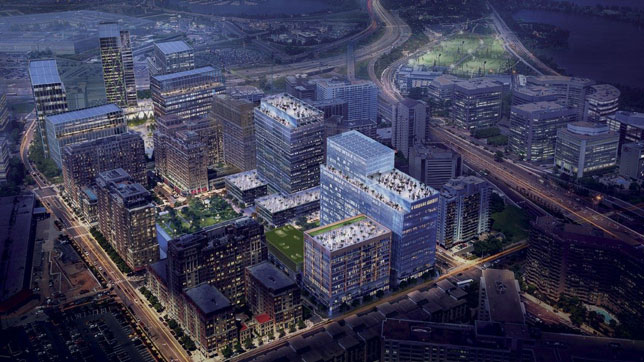STEM
New Virginia Tech Campus to Boost CS Grads
- By Dian Schaffhauser
- 05/28/19

Rendering of Virginia Tech's planned Innovation Campus (Source: Virginia Tech)
Virginia Tech has begun opening up about its plans for a new "Innovation Campus," which it first announced last November. In fall 2020, the institution expects to open the campus in Alexandria, less than a mile from the area's planned Amazon headquarters, with a decade-long goal of eventually graduating 750 master's degree recipients, along with "hundreds" of doctoral students and post-doctoral fellows each year.
Within five years, the school hopes to graduate a total of 500 master's degree students. Majors will focus on computer sciences and software engineering, with specializations in "high-demand" areas, including data sciences, analytics, security and the Internet of Things, and technology and policy.
However, the institution isn't waiting for its new campus to begin that effort. In Blacksburg, VA, where the school's mainstay campus is located, the goal is to increase undergraduate enrollment in related subjects by 2,000 students over the next eight years. And VT is already enrolling master's students in those subjects in both existing locations and temporary spaces, as well as through a robust online program.
The proposed billion-dollar, million-square-foot graduate campus will dedicate about a third of its space (300,000 square feet) to academics and research and development facilities; another third (350,000 square feet) to housing for both students and faculty; a quarter to startups and corporate facilities; and the remainder to retail and support services.
The university and the state of Virginia have both committed to provide $250 million to seed the project. The funding model also requires fundraising, industry partnerships and the creation of other revenue streams by leveraging the shared spaces of the campus plan.
To help with decision-making related to the new campus, Virginia Tech will choose a group of "fellows" to engage with the team that's developing the new campus and the faculty to help with designing the curriculum and spaces. These fellows will hold their positions for a year and will come from the cohorts of CS and computer engineering master's degree students enrolling in existing programs in the school's Falls Church campus this fall. The fellows would take classes, but also commit to spending some part of their time in industry-related events, seminars, community engagement and other activities tied to the planning and design of the Alexandria campus.
"This will be a unique learning experience for these students to essentially help build the Innovation Campus," said Julia Ross, dean of the College of Engineering, in a statement. "We are excited about the ideas and energy that they will bring to the table."
Increasing the number of graduates in tech areas at Virginia Tech and the state's other institutions of higher education was a major part of the proposal put forward by the Virginia Economic Development Partnership (VEDP) when it was vying for Amazon to choose northern Virginia as the site of one of its new national headquarters. The company already had a major presence in the state, with some 10,000 jobs — most in fulfillment and sort centers, "Prime Now" hubs and solar facilities. But the new "HQ2" project committed to creating a minimum of 25,000 jobs, each with an average annual income in excess of $150,000 (roughly double the prevailing wages in that part of the state), and a possible ramp-up to 37,850 jobs.
As part of the proposal to Amazon, VEDP said it anticipated adding an additional 12,500 to 17,500 bachelor's degrees and 12,500 to 17,500 master's degrees in CS and related fields over the next two decades. Currently, about 400 graduates from Virginia colleges and universities are employed in tech jobs at Amazon, 29 percent of those coming from Virginia Tech, specifically.
"Virginia's biggest employment growth opportunity in the years ahead will be in tech — from artificial intelligence to cloud computing to cybersecurity, and everything in between," noted Stephen Moret, president and CEO of VEDP. "Our success in growing the tech sector will be inextricably linked to our success in developing, attracting, and retaining world-class tech talent."
About the Author
Dian Schaffhauser is a former senior contributing editor for 1105 Media's education publications THE Journal, Campus Technology and Spaces4Learning.

